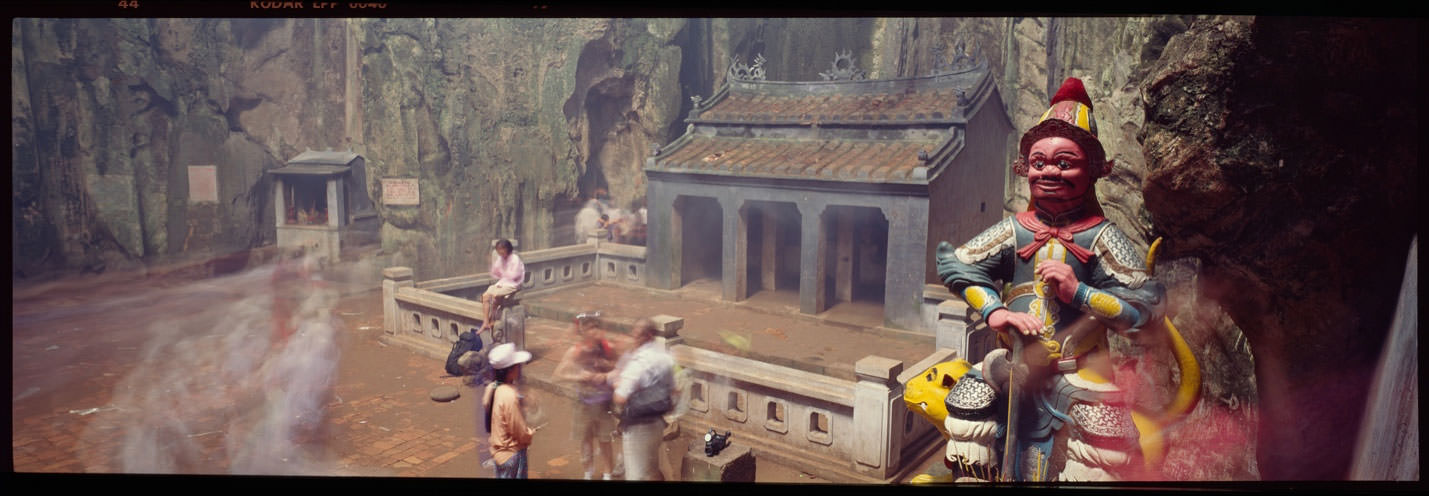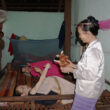Fresh from having hosted a conference at Tulane for the twenty-fifth anniversary of the My Lai Massacre,in December 1994 I traveled to Vietnam with a group from Northern Illinois University.
It was a pivotal time, as the normalization of diplomatic relations were scheduled to take place six months later. Over three weeks, we traveled from Ho Chi Minh City to Hanoi, visiting the Central Highlands on the way north.
In Pleiku, where the first American Special Forces unit was overrun, we stayed in a Russian-built hotel. In the reception area was an unfinished elevator, just a pit filling up with trash. One of the few Vietnamese phrases I learned to deploy on the trip was, Tôi không phải là người Nga, tôi là người Mỹ—I’m not Russian, I’m American. I had heard that to the Vietnamese, their fellow Communists were barbarians.
Throughout the trip, we were surprised by the warmth with which we Americans were received by our former enemy—including, later in Hanoi, Lê Dat, an elderly but still impish poet who in the 1950s had had the temerity to attack the brutal land reform movement. His reward was some years in prison and then, later in 2009, a National Prize for his contributions to Vietnamese literature. That day in Hanoi, Lê Dat, who with some caution agreed to meet for tea in an untraveled alley, gave me some insight with one of his signature aphorisms: “Si les Russes sont des barbares, les Americans sont de grands enfants. Mais les français sont de petits vieillards.” (“If the Russians are barbarians, Americans are big babies. But the French are little old men.”) I took “vieillards” to be polite for cynical and brutal. “Big babies” even more politely left out our own considerable brutality. I later heard that their lack of apparent animosity toward us was something they liked to convey to Americans to make them feel better.
Lê Dat was speaking from the point of view of an incredibly sophisticated culture—one we assumed was primitive and in need of our modernization when we sent our men to wage war there. Yet this is a culture that founded its first university, the Temple of Literature, in 1040; a culture where the word for “poet” has the meaning “he who shapes culture”; and finally, a culture where even the peasants know scores of poems by heart (see John Balaban’s Ca Dao Vietnam: A Bilingual Anthology of Vietnamese Folk Poetry).
Meanwhile, I heard in Lê Dat’s generous remark an unconscious echo of one far darker in Graham Greene’s The Quiet American, his prescient treatment of the coming American War in Indochina. Speaking of Alden Pyle, the American CIA agent who has come to fight his ideological war against communism among a people who, the Englishman Fowler believes, just want more rice, Greene’s narrator states that he had never seen “a man with better motives for all the trouble he caused.”
Eisenhower had voiced these good motives in his 1953 State of the Union Address: “The freedom we cherish and defend in Europe and in the Americas is no different from the freedom that is imperiled in Asia.” Driven by Cold War fears of Communist expansion, at that time we were providing significant financial and military aid to the French in their own Indochina war, including military advisers, tanks, naval vessels, aircraft, artillery, and other supplies. The quiet American promised freedom to, but without independence from.
That’s a big difference when you’ve experienced two hundred years of French, and a thousand years, on and off, of Chinese colonial power. Both of which you defeated. Big babies entering Vietnam, we were clueless. As we sometimes are.
After dinner one evening, a friend and I noticed a group of Vietnamese as we passed the hotel bar. They seemed to be having fun, and we decided to join them. Despite the language barrier—and history—we were warmly received. Toasts began.
When it came my turn, I lifted my glass to tự do—to freedom.
I only knew the word because it was the name of a famous street in Saigon, in its day the city’s Champs Élysées. Under the French it was Rue Catinat, a glamorous district brimming with journalists and secret agents, but during the war between North and South that followed the French War, it was changed to Tự Do to obscure those colonial associations.
“Tự do,” I toasted, “To freedom!”
Their faces fell.
What had I done?
Quickly, one among them saved me.
“Sự thống nhất,” he toasted. “To reunification.”
The best-known slogan in Vietnam is the quote from Ho Chi Minh: “Không có gì quý hơn độc lập, tự do,” or “Nothing is more precious than independence and freedom.”
Yet, for those engineers, tự do without độc lập—independence—and thống nhất—reunification—was just more colonialism on the march.
Today, in honor of April 30, Rue Catinat is known as Dông Khoï—General Insurrection.

“Inside Marble Mountain 1994,” © Neil Alexander, 1994
A former adjunct professor of English, Randy Fertel taught Literature and the Experience of the Vietnam War for many years at Tulane and the New School for Social Research. He codirected Tulane’s 1994 international conference on the twenty-fifth anniversary of the My Lai massacre. Fertel is co-founder with Hamilton Fish of the Ridenhour Prizes for Courageous Truth-Telling.
Fertel is the author of three books, Winging It: Improv’s Power and Peril in the Time of Trump (Spring, 2024), A Taste for Chaos: The Art of Literary Improvisation (Spring, 2015), and The Gorilla Man and the Empress of Steak: A New Orleans Family Memoir (Univ. Press of Mississippi, 2011) .




0 Comments